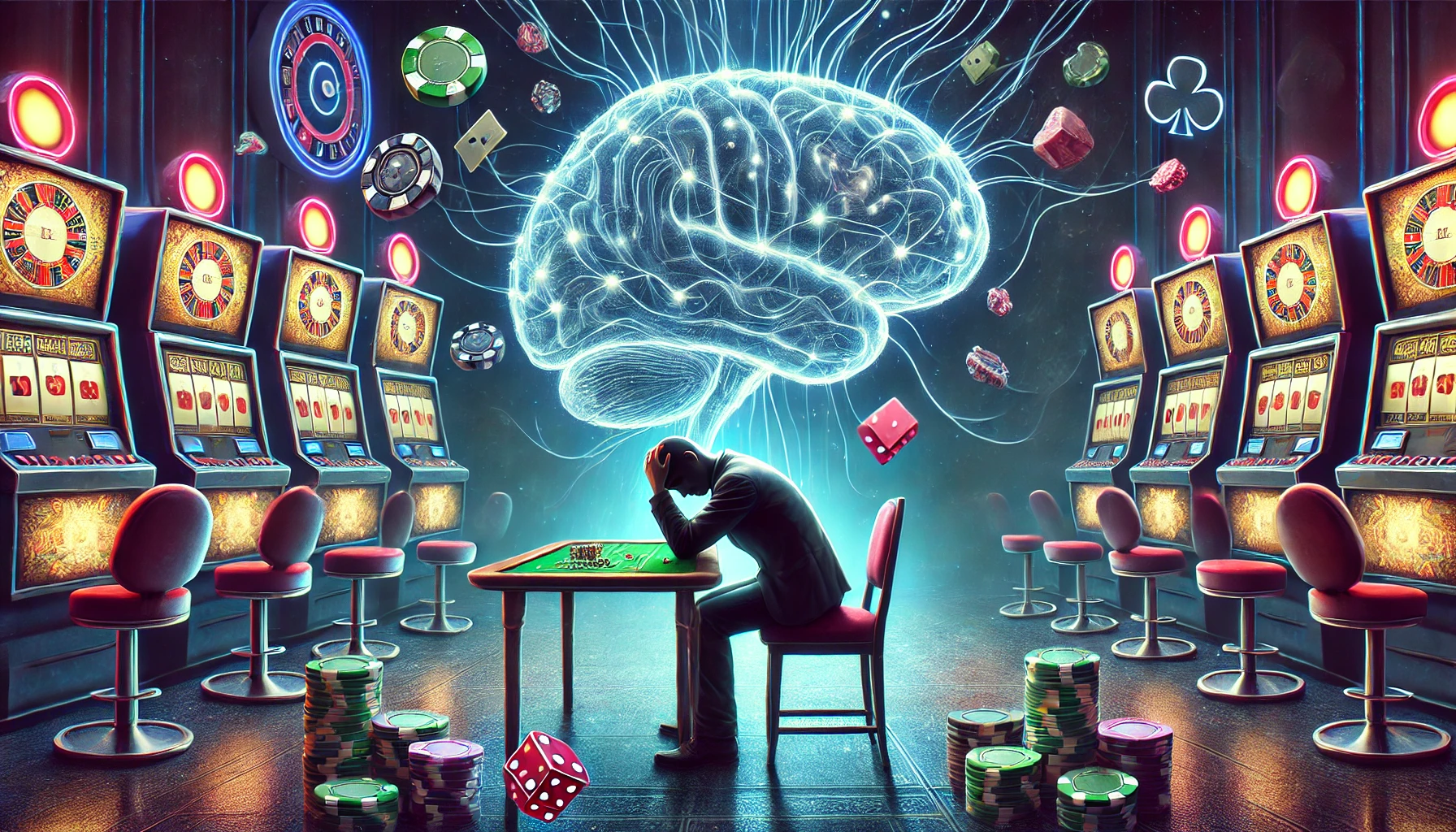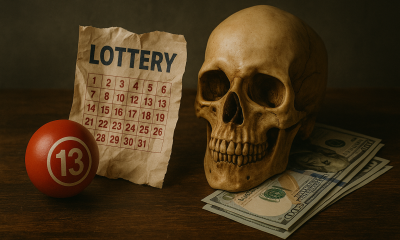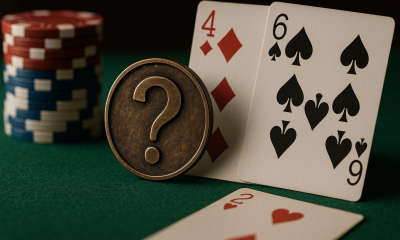Psychology
The Psychology of Losing: How Casino Games Influence Our Minds and Decisions

Losing is all a part of the game, but you should do everything to avoid letting it get to the extremes. It is easier said than done, as playing casino games can alter your dopamine reward system and make it difficult to stop. There is no way of knowing whether you will win or lose the next round. In rare cases, you may turn the tables, cutting all your losses and making a hefty profit on top. But probability and mathematics would say otherwise.
The majority of the time you quit after losing, it feels more frustrating than something truly devastating. But if you take it too far, you can easily land in trouble losing more money than you can afford. It is quite a dangerous slope towards pathological gambling and even addiction. So learning how to process losses and accept them is undeniably one of the most powerful tools in your arsenal. With the right disposition and realistic expectations, you will negate the danger of ending up with heavy losses. Plus, you will be better prepared to learn when to quit while you are ahead.
Losing Psychology and Impacts
The uncertainty is the aspect that makes gambling so appealing. Taking risks and winning will trigger your rewards system, releasing dopamine and making you feel like a million bucks. From the moment you stake your bet, it fuels feelings of stress and hope as you anticipate what will happen next.
But the degree to which you anticipate a win or loss depends wholly on how risky your bet is. Think about the difference between betting on a straight bet or double in roulette, which covers 1/37 segments or 2/37, respectively. Your chances of winning are far shorter than a Red/Black bet covering 18/37 segments on the wheel.
On the other end of the spectrum, there are progressives, or lotto games, for which your chances of hitting the top prize may be hundreds of millions to one. No one really has realistic expectations of winning the lottery, as fantastic as it could be.

Measure of Risk and Frequency
When the bet is riskier, we are more receptive to losses, as you can appreciate the likelihood of winning is so much smaller. When placing a bet that has a nearly 50% chance of winning, the anticipation of a win is stronger. But the joy of winning a 35:1 bet will far outweigh the 1:1 wager, as you recognise the rarity of the win. This is the measure of risk, and the other factor that can alter the amplitude of a win or loss is the frequency.
Winning more frequently will repeatedly release dopamine hits, building your confidence, but also egging you on to play more. Frequent losses may build your stress levels, but you may experience occasional wins to reset the levels. Or, some near misses may balance the negative feelings with positive ones, as they reinforce the idea that a win may be very close.
At the start of your gaming session, the dopamine regulation and anticipation responses are fresh. But as you keep playing, the regulation and responses will alter, more often, making losses feel heavier and reducing the joy felt by winning. If you reach the point of loss aversion, you will become at greater risk of falling prey to common gambler’s fallacies.
How Loss Aversion Works
Casino games play with your psychology. They can, in equal measure, bring you winner’s highs during winning streaks and gambler’s remorse when you lose. After experiencing a bit of both and playing for a good long while, the sentiment will inevitably change. Wins will not feel as good unless they are either significant or form long streaks.
Loss aversion is the phenomenon when the thrill of winning doesn’t match the remorse of losing. As your dopamine levels fluctuate through your gaming, you will need bigger wins to build on the highs. Or, if you are trailing, you may feel the wins are too late and not enough. Whereas the losses just pile on your frustration and stress levels.
The Danger of Early Wins
Imagine triggering a bonus round within 20 rounds on a slot machine. The slots bonus round suddenly gifts you a lump sum of money, sending your dopamine levels through the roof. In the next 20 rounds, you hit some big paylines, but nothing that compares with the big win. So you set your target on hitting another bonus round. Let’s say eventually it does come, but the round fails to produce half of what you made in the first bonus round. You won’t really feel the same highs as before.
Playing Catchup and Overdue Wins
Conversely, losses will not reduce in amplitude but only grow bigger. Let’s say you are down 10% of your baccarat bankroll after the first 50 hands. The game has lots of variance, and right now it hasn’t worked in your favour. However, you keep playing in the hope that fortune will shine your way and the wins will gradually come through. But now there’s an added level of stress, as your instinct tells you to keep playing until you have cut the losses to a minimum. Any wins from that point onwards will feel overdue, and as if you are just playing catchup.

Common Ways We Rationalize Losses
The way we deal with these losses will also change after time. In the beginning, most players belittle losses and accept them as part of the game. Sure, you lost right now, but if you continue to play you can cancel it out in the long run. While that may happen, there are no guarantees that the actual outcomes will properly reflect the statistical probabilities. This is one of the faults in the Monte Carlo system, which attempts to predict the outcomes by simulating millions of rounds in a game. It attempts to figure out the frequencies of wins and the point at which the outcomes match the probabilities.
In theory, the more rounds you simulate, the closer you will get. As it will rule out any statistical anomalies and the variance will gradually reduce. But even then, the odds are still not in your favour. The house has an edge, which it takes by cutting out a small percentage of your wins. The implied probability therefore becomes greater than the actual probability of winning. Simply put, you need to win more times than is statistically likely to make a profit. If you were to see out the Monte Carlo method, the theories all point to you eventually losing your money, the notion of the gambler’s ruin.
Typical Gambler’s Fallacies Experienced After Losing
The classic gambler’s fallacy is when a player thinks that previous results will somehow influence the following ones. It doesn’t just comprise trying to read patterns or look for combinations of frequencies.
Thinking that you are overdue a win or that a result has occurred too many times is part of the fallacy. Outcomes can still be random even if they repeat themselves or occur more frequently than the probability would state.
For example, the two most likely Baccarat outcomes are the Banker bet winning (around 45%) and the Player bet winning (nearly 43%). So then if you were to bet on the Banker, it wouldn’t be unreasonable to expect winning 4-5 hands from every 10 games. But there is also a possibility that you would win all 10, or none at all.
In shorter periods of time, variance is often a lot higher, practically ruling out any assumptions that you make about the game. If you hit a straight number bet in your 10th try, the variance is already working in your favour. But what happens in one round has no bearing on the next.
Chasing Losses
The results are always random in any casino game you play. Card games use multiple decks and shuffle them to ensure fairness. Plus, after a portion of the shoe is used, dealers generally reshuffle the cards. If you are playing online casino card games, the decks in games are continuously shuffled after each hand. RNG casino games such as slots use powerful algorithms to make every result fully random.
However, the games and gaming environment are designed to make you want to play more. Especially when you are losing. And players who are hyped up and making impulsive decisions may feel the urge to chase their losses. The idea is that when you have made back your losses and returned to your original bankroll, you quit.
But it is a very dangerous game as there are no guarantees you will ever make it back up to your target. The house edge shouldn’t be underestimated, and there is a possibility that your continued gaming will just incur heavier losses.

Thinking Your Tactics Are Unbeatable
You need a good plan to stick to when playing casino games. For instance, a winning or losing target, a solid bankroll to sustain lots of rounds, and to always be prepared to quit. But having a strategy doesn’t mean you are bound to win.
The gambler’s conceit is a very common fallacy, one that starts before you start gaming and can lead down some dangerous paths. It is the notion that you can always quit while you are ahead, and therefore will always beat the house. You basically overestimate your chances of making a profit.
When losses come, you rationalize them as part of the variance, and the plan is to weather the storm. But you may never get the chance to quit on a high. Or, you may come close to your target but then see a slump of losses take you away from it. And then you end up chasing your losses.
Losing in Skill Based Games
Though we don’t really call them skill-based games, because blackjack, video poker and poker use pure chance. The illusion of control in these games gives players the belief that they can learn how to enhance their chances of winning. And that they have a direct influence over the outcome of a hand. Whereas in actual fact, the outcomes are completely random.
It is true, but even the most talented of players or best blackjack strategy cannot save you from a poor draw. If the Dealer has 7 and you have 16, most blackjack strategies will tell you to hit. But if you hit and draw 10, you go bust and lose. But then let’s say you don’t hit, and the dealer flips the face-down card and it is just 5. Then, the dealer draws the next card from the shoe – a 10 which sends them to 23, Bust!
In these games, it is easier to feel gambler’s remorse. After all, if you had decided differently you may have won the game. But there is no way of knowing what the next card will be, even if you count cards in blackjack. Losses are a part of the game and don’t occur because the shoe is unlucky or the player next to you is an amateur.
How To Properly Rationalize Defeats
Ultimately, you have to be able to accept losses and never let your emotional side take over. It is not your fault that you lost, nor is it the houses. But you are responsible for taking control and calling it quits before you overspend.
You can do so by making deposit limits, setting loss markers and reality checks to fully control your gambling. And as for the feeling of losing. The best remedy is to take a break and come back when your dopamine regulation has balanced out. Then, you are ready to test your luck once again.











